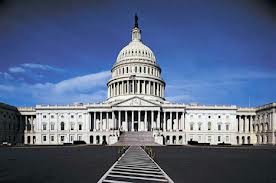
CONGRESSIONAL
PREROGATIVES
IN THE CONVENTION PROCESS
Congressional prerogatives: Congresshas great latitude in the
eventual composition
of an Open Convention.
It is greatly restricted by the States when a “SINGLE ISSUE” Federal
Convention is being convened.
The Founding Fathersprovided two ways for
Americansto peacefully modify their
Constitution: 1) through proposed Amendments by Congress to the States for
ratification; and 2) through Calls for a Convention by State Legislatures
(Congress cannot Call for or convene a Convention on its own). The Convention
method is a way for the people to judge the Constitution itself.
There are several prerogatives in Article V of
the Constitution that Congressretains which provides a
modicum of protection from rogue elements at an Open Convention and some
influence over a “SINGLE ISSUE” Convention:
1)
Congresswould have influence and/or
control of the timing,
place,composition and
maybe length of an “Open” Convention.
Congress could recommend to State Legislatures that a Convention be
limited to a period of time. The States would have to confirm this through
binding agreements, thereby limiting the Convention to the pre-agreed time
period. Other agreements between Congress and the States are also possible in
order to convert a Called for Amendment Convention into a limited or “SINGLE
ISSUE” Convention. Congress is not likely to pursue this approach because it
would be easier to find agreement with the States on the wording of a State
supported Amendment than to try to limit a Called for Convention. Note, these
scenarios require the States to initiate a Call for a Convention in order to
secure a desired end.
2) Congress
will have some influence on the selection of delegates to a Federal Convention
through the State and Congressional political process.
3) Once
a Convention has completed its work, Congresshas the authority to send
the proposed Amendment(s) to either State Legislaturesor State Conventionsfor ratification.
This prerogative can prevent State Legislatures from completely controlling
the ratification process.
4) Congress
will have some influence on the selection of delegates to State Ratification
Conventions. The composition of State delegates at
State Conventions will affect the outcome of ratification votes. However,
separate Delegate Resolutions by State Legislatures can prohibit Congress'
influence or control
of delegate votes at the Convention.
Because Article V authorizes Congress to alter
the Constitution through proposed Amendments, each Legislative Call for a
‘SINGLE ISSUE” Federal Convention will force Congress to decide if it will
send our Amendment(s) to the States, voluntarily, for ratification or be
forced to convene a Convention. CITIZEN INITIATIVES will be trying to
persuade Congress to send it on its own. If Congress refuses to address our
grievances and refuses to send our Amendment(s) to the States for
ratification, then Legislative Calls from the States for “SINGLE ISSUE”
Federal Conventions will go forward.
Whatever a Federal Conventionproposes to the States, it
must be ratified
by ¾’s of the 50 States.
There is no option at a “SINGLE ISSUE” Federal Convention to change the
ratification requirements. The Constitution cannot be altered in any way
except for the language of the proposed Amendment in the States’ Legislative
Calls. It is virtually impossible for the Constitution to be tampered with
through “SINGLE ISSUE” Federal Conventions because
the States will have entered into an irrevocable contract between the Calling
States that predetermines the terms and conditions at the Convention.
Approximately 5,000 amendments have been
proposed by members of Congressover the last 220 years.
Only 27 were ratified by the States. Ten of these Amendments are the Bill of
Rights. Initially, there were 12
Amendments proposed to the States by our first Congress. Ten were ratified
shortly after the States received them and one was ratified in 1992. The
ratification process was the Founding Fathers way of making certain that no
proposed amendment slips past the States without the States controlling the
outcome. They never assumed their Constitution would settle all issues past,
present and future. They left the door open for prudent men to resolve future
conflicts through Article V and other mandates in the Constitution. When
Congress, the Courts and/or Executive Branch are unwilling to address
egregious wrongs suffered by the people, then the people through State
Legislatures have
the authority to force Congress to act.